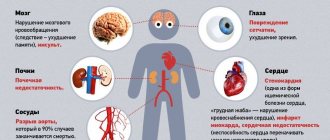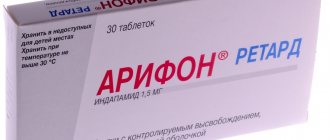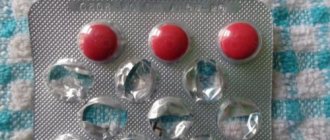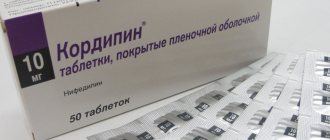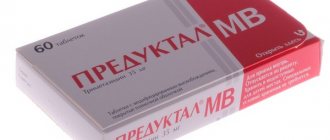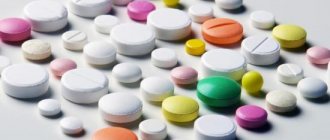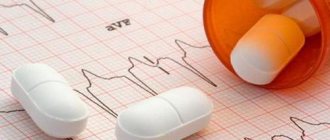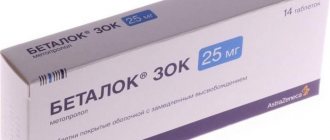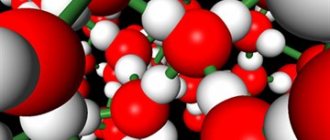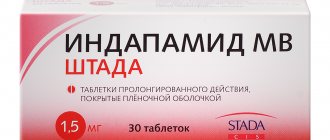Pharmacological properties of the drug Arifon retard
Indapamide ((RS)-4-chloro-3-(sulfamoyl)-N-(2,3-dihydro-1H-indol-1-yl)-benzamide) is a diuretic, antihypertensive agent. The chemical structure is a sulfonamide derivative with an indole ring. Its pharmacological properties are similar to thiazide diuretics. Due to the complex mechanism of action, Arifon has a pronounced hypotensive effect and does not cause a significant diuretic effect. The action is carried out at the level of the kidneys and blood vessels. At the kidney level, indapamide increases the excretion of sodium and chlorine ions in the urine, and to a lesser extent, the excretion of potassium and magnesium, contributing to a slight increase in diuresis. The effect of indapamide on the vascular wall is due to its high lipophilicity. Indapamide changes the transmembrane flow of ions (mainly calcium), reduces the sensitivity of the vascular wall to adrenaline and stimulates the synthesis of substances with vasodilatory activity - prostaglandin E2 and prostacyclin I2. This leads to dilation of arterioles, a decrease in peripheral vascular resistance and blood pressure. Arifon reduces left ventricular hypertrophy; does not affect lipid metabolism (TG, LDL cholesterol, HDL cholesterol) and carbohydrate metabolism, including in patients with hypertension (arterial hypertension) and diabetes mellitus, reduces the severity of microalbuminuria. The antihypertensive effect of the drug persists in patients on hemodialysis. The use of an innovative dosage form based on a hydrophilic matrix ensures uniform release of indapamide and effective blood pressure control for 24 hours, and also allows reducing the content of indapamide per tablet to 1.5 mg and thus reducing the risk of hypokalemia by 62%. When prescribed at a dose of more than 1.5 mg, the antihypertensive effect of the drug does not increase, while the likelihood of side effects increases. Indapamide is quickly and completely absorbed from the digestive tract. The maximum concentration in the blood serum after a single dose is reached after approximately 1–2 hours. The equilibrium state is achieved after 7 days from the start of treatment. 79% of indapamide binds to plasma proteins. The half-life averages 18 hours (14–24 hours). About 70% of indapamide is excreted in the urine, 22% in feces. The pharmacokinetics of the drug does not change in patients with renal failure. In patients with hepatic impairment, the use of thiazide or thiazide-like diuretics may cause the development of hepatic encephalopathy.
Pharmacokinetics of the drug
Arifon Retard should be taken orally for high blood pressure. After administration, the tablet enters the gastric tract, where it dissolves under the action of gastric juice, releasing the active components.
The maximum content is reached 12 hours after administration. The blood pressure medication has a prolonged effect. To achieve a therapeutic effect, it is necessary to take Arifon Retard at blood pressure regularly for the prescribed period.
When taking the tablet with food, the rate of absorption decreases, but the degree of absorption is not affected by food intake.
When it enters the bloodstream, the active component indapamide binds to proteins. They transport the substance to blood vessels and organs. Maximum binding to plasma proteins is achieved a week after the start of the course. The remaining medication is excreted through the kidneys in the urine.
Side effects of the drug Arifon retard
Considering the fact that most of the side effects of indapamide are dose-dependent, reducing the content of the active substance in the Arifona retard tablet to 1.5 mg made it possible to significantly reduce the likelihood of developing side effects. Hypokalemia may develop (especially in patients at risk); hyponatremia, accompanied by hypovolemia and dehydration with the possible development of orthostatic hypotension. Concomitant loss of chloride ions may secondary cause compensatory metabolic alkalosis. Hyperuricemia and hyperglycemia are possible; hypercalcemia is very rare. Hematological disorders develop extremely rarely: leukopenia, thrombocytopenia, agranulocytosis, hemolytic or aplastic anemia. From the digestive tract, nausea, constipation, dry mouth are observed, in isolated cases - pancreatitis, in patients with liver failure - hepatic encephalopathy. From the central nervous system - dizziness, asthenia, paresthesia, headache. Hypersensitivity reactions are possible in patients prone to them (maculopapular rash, purpura, exacerbation of systemic lupus erythematosus).
Drug interactions
When taking Arifon Retard for high blood pressure, you must inform your doctor about any other medications you are taking.
Blood pressure tablets Arifon Retard cannot be combined with a number of drugs:
- lithium-containing drugs can cause an overdose;
- antiarrhythmic drugs and antibiotics increase the likelihood of heart rhythm disturbances;
- non-steroidal anti-inflammatory drugs reduce the hypotonic effect;
- steroids and prokinetics reduce potassium concentrations;
- the muscle relaxant Baclofen increases the antihypertensive effect;
- the sugar-lowering drug Metformin disrupts the acid-base balance;
- psychotropic and antipsychotic drugs lower blood pressure;
- The immunosuppressant Cyclosporine increases creatinine levels.
Arifon Retard cannot be combined with taking a number of medications
Special instructions for the use of the drug Arifon retard
Before starting treatment and during the period of use of the drug, the level of potassium, sodium, calcium and glucose in the blood plasma should be monitored, kidney function should be monitored (creatinine and urea levels in the blood plasma) and ECG monitoring, especially in cases of water-electrolyte balance disorders and gout , diabetes mellitus, liver or kidney failure, in elderly patients. Hypokalemia (less than 3.4 mmol/l) is a predisposing factor in the development of dangerous arrhythmias and increases the toxicity of cardiac glycosides. Such patients should more often monitor the level of potassium in the blood serum and correct it, especially in patients at risk (elderly people, with an unbalanced diet, in patients with liver cirrhosis, coronary artery diseases, heart failure, with a prolongation of the QT by ECG). The possible development of hyperuricemia contributes to the occurrence of gout attacks. The use of the drug in athletes may cause a positive reaction during doping control. The drug is not recommended for use in children. Arifon retard does not interfere with psychomotor reactions and can affect the ability to drive vehicles and operate dangerous machinery only in the event of a sharp decrease in blood pressure. It is not recommended to prescribe the drug during pregnancy and breastfeeding.
Contraindications
Absolute
Drinking Arifon Retard with high blood pressure is contraindicated when:
- individual intolerance to components;
- renal dysfunction;
- liver failure;
- potassium deficiency;
- hypolactasia.
Relative
Blood pressure tablets Arifon Retard are taken with extreme caution when:
- acid-base imbalance;
- weakened immunity;
- diabetes;
- increased uric acid content.
Interactions of the drug Arifon retard
The simultaneous administration of the following drugs with Arifon retard is not recommended: lithium salts (an increase in the concentration of lithium in the blood serum with the development of toxic manifestations; if it is necessary to prescribe such a combination, the level of lithium in the blood serum should be monitored), astemizole, bepridil, erythromycin, halofantrine, pentamidine, sultopride , terfenadine, vincamine (increased risk of developing ventricular flutter-fibrillation, especially in the presence of hypokalemia, bradycardia or prolongation of the QT ). The following drugs should be prescribed with caution along with Arifon retard: NSAIDs for systemic use, including salicylates in high doses (possible development of acute renal failure in patients with dehydration; it is necessary to monitor kidney function and rehydrate), drugs that reduce the level of potassium in the blood - amphotericin B with intravenous administration, gluco- and mineralocorticoids for oral administration, tetracosactide, laxatives that stimulate peristalsis (increase the risk of hypokalemia), corticosteroids, tetracosactide (reduced antihypertensive effect as a result of water and sodium retention in the body), cardiac glycosides ( hypokalemia increases the risk of developing toxic effects of digitalis), potassium-sparing diuretics - amiloride, triamterene, spironolactone (possible development of hyperkalemia in patients with renal failure), ACE inhibitors (possible development of sudden arterial hypotension or renal failure due to hyponatremia in patients with dehydration; it is recommended to stop using the diuretic 3 days before prescribing ACE inhibitors, then, if necessary, the diuretic is resumed), antiarrhythmic drugs - quinidine, hydroquinidine, disopyramide, bretylium tosylate, sotalol and amiodarone (the risk of developing paroxysms of flutter-ventricular fibrillation increases, especially in the presence of hypokalemia or prolongation of the QT interval), metformin (risk of developing lactic acidosis due to the development of renal failure), iodine-containing contrast agents (with dehydration caused by the use of diuretics, the risk of developing acute renal failure increases; fluid and electrolyte balance should be restored before contrast administration), tricyclic antidepressants ( potentiate the hypotensive effect and increase the risk of developing orthostatic hypotension), calcium salts (risk of developing hypercalcemia), cyclosporine (increased serum creatinine levels), estrogens (due to fluid retention in the body, the hypotensive effect of the drug may be reduced).
How to take for high blood pressure and hypertension
The tablets are taken orally whole with a sufficient amount of water. The drug is taken once a day. Increasing the dosage with pressure is not required, since this will not affect the therapeutic effect.
Increasing the dosage leads to an increase in diuretic effect, but this does not affect blood pressure.
You need to take the tablets daily for the period prescribed by your doctor. Before using the tablets, you must read the instructions for use of the drug Arifon Retard.
Overdose of the drug Arifon retard, symptoms and treatment
Symptoms of overdose (taking very large doses) are primarily manifestations of water and electrolyte disturbances (hyponatremia, hypokalemia). Clinically, nausea, vomiting, hypotension, convulsions, drowsiness, dizziness, polyuria or oliguria up to anuria (which is a consequence of hypovolemia) may occur. First aid measures include rapid elimination of the drug by gastric lavage and/or administration of activated carbon, followed by restoration of water and electrolyte balance in a hospital setting.
Release form and composition
Dosage form – controlled-release tablets, film-coated: round, biconvex, white (blister of 15 pcs., 2 blisters in a cardboard pack; blister of 30 pcs., 1, 3, 10 or 30 blisters in a cardboard pack ).
1 tablet contains:
- active ingredient: indapamide – 1.5 mg;
- auxiliary components: povidone, hypromellose, lactose monohydrate, colloidal anhydrous silicon dioxide, magnesium stearate;
- film shell composition: macrogol 6000, glycerol, hypromellose, titanium dioxide, magnesium stearate.
Arifon's analogues
All drugs containing indapamide are synonyms and direct analogues of Arifon retard, the prices of which differ depending on the manufacturer. These drugs from domestic and foreign manufacturers are presented on the Russian pharmaceutical market in dosages of 1.5 and 2.5 mg.
Analogues of Arifon in tablets according to the active substance are the following trade names:
- Indapamide;
- Indap;
- Indapen;
- Indopres;
- Ipamid;
- Ravel SR;
- Softensif.
Replacing Arifon retard with other drugs that differ in active ingredients, but have similar effects. The following drugs are analogous in action:
- analogues based on chlorthalidone - Oxodolin, Tenoric (combination with atenolol);
- products based on xipamide - Xipogamma;
- combination drugs containing an antihypertensive component and indapamide - Noliprel, Prestarium arginine combi;
- drugs that contain hydrochlorothiazide, including in combination with antihypertensive components - Hypothiazide, Enap H, Enap HL, Ko-renitek, Gizaar, Micardis plus, Fozikard H, Hartil-D, Co-Diovan, Co-Prenessa, Valsacor N, Lozap plus;
- potassium-sparing diuretics, including combination ones - Amiloride (Moduretic), Eplerenone (Inspra, Espiro), Spironolactone (Veroshpiron), Triamterene (Triampur comp.);
- loop diuretics - Furosemide, Torasemide.
Caution should be exercised when replacing medications with analogues, since many drugs can increase the level of glucose and uric acid in the blood and reduce the amount of potassium.
Analogues of Arifon retard and average cost.
| Name | Active substance | Release form | Manufacturer | Average cost of minimum dosage and packaging |
| Indapamide | Indapamide | Pills | Teva, Bulgaria | From 101 rub. |
| Akrikhin, Poland | From 80 rub. | |||
| Indapamide retard 1.5 mg | Nizhpharm, Russia | From 121 rub. | ||
| Tatchimpharmpreparaty, Russia | From 80 rub. | |||
| Teva, Bulgaria | From 120 rub. | |||
| Arifon | Servier, France | From 380 rub. | ||
| Arifon retard | From 350 rub. | |||
| Indap | Capsules | Promed, Czech Republic | From 112 rub. | |
| Oxodoline | Chlorthalidone | Pills | Organika, Russia | From 1170 rub. |
| Tenoric | Chlorthalidone+Atenolol | Ipka, India | From 170 rub. | |
| Xypogamma | Xipamide | Artesan, Germany | From 330 rub. | |
| Hypothiazide | Hydrochlorothiazide | Sanofi, Hungary | From 100 rub. | |
| Enap N | Gilrochlorothiazide+Enalapril | KRKA, Slovenia | From 250 rub. | |
| Inspra | Eplerenone | Pfizer, France | 2990 rub. | |
| Espiro | Akrikhin, Poland | From 770 rub. | ||
| Veroshpiron | Spironolactone | Tablets, capsules | Gedeon Richter, Hungary | From 120 rub. |
| Triampur comp. | Triamterene+Hydrochlorothiazide | Pills | Teva, Croatia | From 380 rub. |
| Furosemide | Furosemide | Ozon, Russia | From 35 rub. | |
| Valsacor N | Valsartan+Hydrochlorothiazide | KRKA, Slovenia | From 620 rub. |
Side effects
Side effects in most cases depend on the dose of the drug.
During treatment, adverse events from the following systems and organs may occur:
- gastrointestinal tract, liver and biliary tract: uncommon – vomiting; rarely – dry mouth, constipation, nausea; very rarely - liver dysfunction, pancreatitis; frequency unknown - hepatitis, hepatic encephalopathy (in patients with liver failure);
- cardiovascular system: very rarely - marked decrease in blood pressure, arrhythmia; frequency unknown - ari (sometimes fatal);
- central and peripheral nervous system: rarely – headache, asthenia, paresthesia, vertigo; frequency unknown - fainting;
- hematopoietic system: very rarely - leukopenia, hemolytic anemia, thrombocytopenia, aplastic anemia, agranulocytosis;
- urinary system: very rarely - renal failure;
- skin and subcutaneous fat: hypersensitivity reactions (mainly of a dermatological nature); in patients with a predisposition to asthmatic and allergic reactions: often – maculopapular rash; uncommon – rheumatic purpura; very rarely - toxic epidermal necrolysis, urticaria and/or Quincke's edema, Stevens-Johnson syndrome; frequency unknown – worsening of systemic lupus erythematosus, photosensitivity;
- laboratory tests: very rarely - hypercalcemia; frequency unknown - hypokalemia, hyponatremia, increased concentrations of glucose and uric acid in the blood, increased activity of liver enzymes, increased QT interval on the electrocardiogram.
If kidney function is impaired
The use of the drug is contraindicated in severe renal failure.
At the beginning of treatment in patients with normal renal function while taking Arifon retard, a decrease in glomerular filtration is possible, which is a consequence of hypovolemia caused by dehydration and loss of sodium ions. In this case, the increase in the concentration of urea and creatinine in the blood plasma occurs, as a rule, without consequences. Caution should be exercised in patients with renal failure, as such disorders may worsen their condition.
